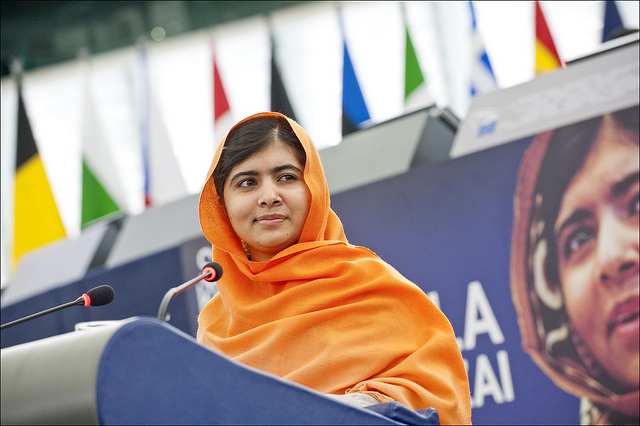by Lorelien Schepers
“One book, one pen, one child, and one teacher can change the world”, says Malala Yousafzai. Surely, the story of this Pakistani teenage girl does not need an introduction. Malala, an avid advocate for girls’ rights to education in her native Pakistan, managed to start a global campaign for female education after receiving worldwide attention when the Taliban shot her in the head at age 15. Malala’s subsequent work in the field of children’s rights has dubbed her the status of a heroine in the West: she is praised for her courage and willpower, has gained support of world leaders, celebrities and humanitarian organisations alike. But did you know that she is not that popular in her home country?
In her native Pakistan, Malala’s position is rather controversial. Over the years she has been the target of criticism, ridicule and smear campaigns. Directly after the shooting, some voices claimed that Malala and her family were part of a conspiracy. While some maintained that she faked her injuries – “it’s impossible to survive a shot in the head” – to get a visa to whichever Western country, others believed the assassination attempt on “CIA spy Malala” to be orchestrated by the USA in order to slander the Taliban.
Critics have accused her as well of defaming Pakistan as she revealed the harsh reality of Taliban rule, of being anti-Islam and anti-Pakistan. Contrary to what one might think, it is not just conservative activists and conspiracy theorists spreading anti-Malala views: her own peers and organisations in the field of education have done so as well. Most notably The All Pakistan Private School Federation – representing 150,000 Pakistani schools – organised the first “I am not Malala” day filled with demonstrations and lectures on November 10, 2014 to condemn the teenager and her views.
As it is often the case with the recipients of prestigious awards, criticism only increased after Malala had been awarded the Nobel Peace Prize in 2014. ‘I hate Malala’ campaigns thrived on social media and in Pakistani society. Critics claim that Malala was ‘not qualified’ to receive the world’s recognition, or dubbed her a ‘Western puppet’ unable to understand how she is being used by the West to divert attention from abuses by the West in Pakistan. Those voices claim that her fraternizing with the American drone attackers makes her a traitor, blatantly forgetting how Malala continuously questions the use of drones. Others somewhat jealously ask ‘Why Malala?’, why is she given benefits while others suffer? How does giving her privileges help Pakistan?
But mostly, it is questioned why the West admires Malala, and not the thousands of others daily battling for education. Why not the invisible victims of drone warfare? These critics say that it is not Malala’s perceived heroism that has made her the darling of the West, but rather how her story fits the narrative of white men saving Muslim women, thus justifying Western interventions. This account, however, fails to recognize Malala’s own agency.
She is the one inspiring others to support girl’s education, not the West – albeit it has given her the stage to spread her message. She is speaking up knowingly that doing so goes against her culture that is hesitant to put women in the public eye, her culture that is suspicious of the West. Yes, she relies on Western media to speak up, but she does not hesitate to call out Western leaders on their flaws either.
Nevertheless, it would be incorrect to claim that all Pakistanis hate Malala. Polls revealed that 44% (out of 2,000 respondents) were pleased with her nomination for the Nobel Peace Prize, with another 44% indifferent and only 11% displeased with the nomination. Malala’s supporters find her to be a source of pride and hope and ‘a positive influence’ as she could inspire others. Moreover, since Malala has repeatedly proclaimed her love for her home country, supporters think of her as an ambassador of a ‘softer’ Pakistan, not focusing on extremism and violence.
But where the criticizing minority is so very vocal, her supporters are reluctant to talk about her or be associated with her, often out of fear for retributions by the Taliban. Anti-Malala activists attempt to back their ‘Pakistan hates Malala’ narrative by the fact that Malala’s biography is not sold in her home country, disregarding the Taliban’s threats to target all bookshops stocking the book. Or by referring to the 2012 student protests at Saidu Sharif College in Swat Valley (Malala’s home) who were against its renaming to ‘Malala Yousafzai Girls College’, neglecting that the students only did so out of fear to become a target for the Taliban.
Controversial or not, misrepresented in the media or not, Malala has become a global symbol for universal education. With more than 124 million children and teenagers out of school worldwide and 63 million girls not receiving 12 years of education, can you condemn a teenager who has been able to raise global awareness?
Image by European Parliament, taken from flickr




